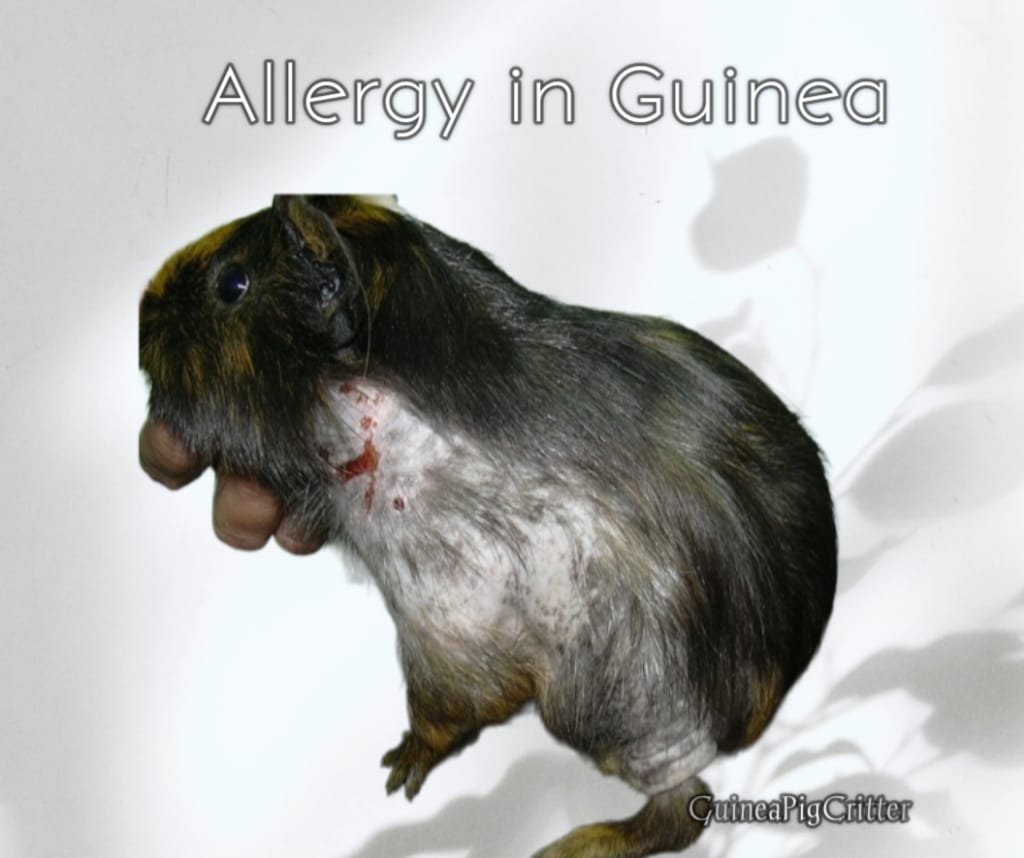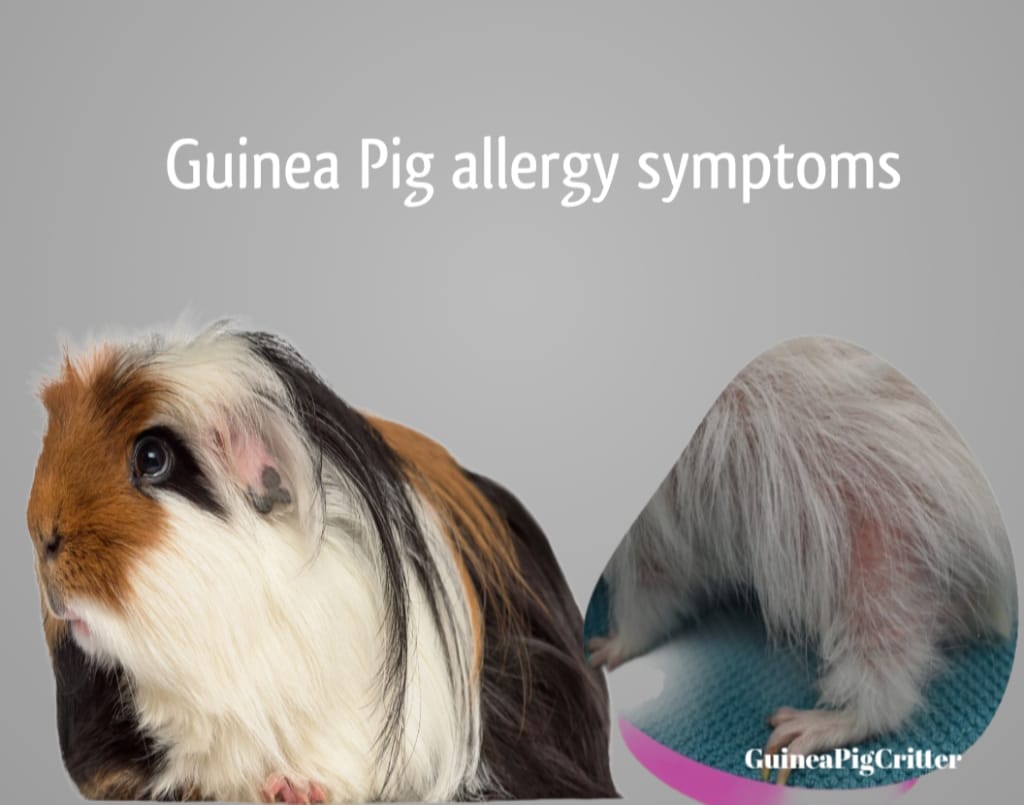Because of their amiable character and easy maintenance, guinea pigs, also known as cavies, are globally leading in small pets. In spite of their endearing temperament, some individuals may be allergic to them.
Allergy reactions can range from mild to severe and greatly affect life quality even though they’re still dear pets. To maintain your health and bond with your guinea pig you need to acknowledge and manage these symptoms.
See this post: Do guinea pigs take bath?
This guide is aimed at giving a clear insight into guinea pig allergy signs:
What causes them, how to diagnose them and effectively handle them. Whether you are an allergy sufferer or a pet owner who wants more knowledge on allergies about guinea pigs, this comprehensive article will cover all that.
General allergic reactions
Allergic reactions to guinea pigs could involve various parts of the body in different ways. Here’s a closer look at the most common symptoms:
Skin reactions
Hives: this type of skin condition manifests itself as raised itchy welts on the skin called hives or urticaria. It is often caused by some allergic reaction; thus their sizes and shapes may vary. Hives can appear over large areas or be concentrated on particular zones of the body. This itchiness can become intense causing further irritation thereby worsening the problem.
Rashes
Rashes: red, swollen patches on the skin are among the symptoms of an allergic rash. These may be dry or blistered and are often found in places that contact guinea pigs or their bedding. Scratching such rashes is agonizing and at times can lead to infections.
Itching: itchy skin is a usual indicator of skin allergies. It could be localized or generalized. Scratching due to the itching worsens the irritation thereby resulting into either skin damage or infection.
Respiratory issues
Sneezing: sneezing is a natural reflex action for clearing nasal passages of irritants. Many sneezes might point to an allergy commonly brought about by dander as well as other particles guinea pig produce when airborne.
Running nose / blocked sinuses: allergic rhinitis causes sinus congestion or a runny nose. This condition sometimes causes discomforts that can affect normal activities . The nose may run clear and watery, while nasal congestion makes it difficult to breath through nostrils.
Wheezing: a whistling sound produced while breathing with high pitch, usually caused by airway swelling is what wheezing is all about. If accompanied by guinea pigs’ presence, wheezing might be a sign of asthma or allergy reactions.
Difficulty breathing or shortness of breath is a more severe symptom for allergies and may need urgent medical attention than the previous one. It can happen when an individual’s respiratory tract is significantly inflamed or obstructed.
Irritants in the eye
Redness: allergic conjunctivitis could cause red eyes as they become irritated and swollen. This often presents with other symptoms such as itchiness, tear production and so on.
Itching: often, itchy eyes are associated with allergies. Rubbing them can make the eyes more irritated and worse.
Watery eyes: when exposed to allergens, our bodies respond by producing excessive tears or making our eyes watery. This might be uncomfortable and necessitate use of appropriate eye drops or medications.
Other symptoms
Coughing: continuous coughing may indicate that one has developed respiratory allergies as his/her body attempts to eliminate irritants from their respiratory air passages. One’s cough may either be productive of mucus/phlegm or dry.
Swelling: in severe allergic reactions, swelling possibly occurs in places like the throat or face. It is an indication of anaphylaxis which is a grave life-threatening condition therefore medical help should be sought now.
Fatigue: allergic reactions can lead to general fatigue and malaise. Fatigue is a result of repeated exposure to allergens and the body’s energy-consuming response in fighting them leading to general malaise.

What causes guinea pig allergies?
It is important to understand the causes of guinea pig allergies so as to be able to manage and prevent symptoms. Here are some common sources of allergens associated with guinea pigs:
Dander
Dander consists of tiny flakes of skin that have been shed by guinea pigs into the air where they can be inhaled causing allergic reactions. These particles however persist on surfaces and the environment hence it is one of persistent allergen.
Saliva
Guinea pigs groom themselves a lot, which means that they spread their saliva all over their fur. The proteins in their saliva lead to allergic reactions if people with this sensitivity touch it or when it becomes airborne through direct contact.
Urine
Proteins and other substances found in the urine from guinea pigs may cause allergic reactions. It could either become airborne after drying out or absorbed by bedding materials increasing your risk for an allergy attack.
Feathers and fur
While guinea pigs do not have feathers, their fur can attract dander, dust, and other allergenic particles. Particularly when it gets scattered or is mounted, this fur might precipitate allergy symptoms.
Diagnosis
It is important to correctly diagnose guinea pig allergies so as to effectively manage them. Here are ways of diagnosing allergies and their triggers:
Seeking medical advice
If you suspect that you have an allergy to guinea pig, the first step is to seek medical services. A doctor can examine your symptoms, review your history, and recommend some tests.
Testing for allergies
Skin prick tests: it involves administration of tiny amounts of allergens onto the skin through slight pricks. If redness or swelling develops at the test site, it means that there is an allergy to such a substance.
Blood tests: these tests check specific antibodies (age) against allergens. High levels of these antibodies can confirm that immunoglobulin e has reacted with guinea pig proteins thus bringing about allergic response.
Identifying triggers
Keeping a record of symptoms helps someone identify possible causes easily. Establish when signs occur, their intensity and any exposure to guinea pigs. With this information, your physician will be able to differentiate between allergic reactions.
Managing guinea pig allergies
To control guinea pig allergies well it takes reducing contact with substances causing it and the treatment of affected parties’ ailments. Here are some strategies for managing allergies :
Reducing exposure
Cleaning and grooming: clean the home of your guinea pig, including its dwelling place, bedding, and toys regularly. Use a vacuum cleaner with heap filters to capture dander. Frequently groom your guinea pig so as to reduce the quantity of loose hair and dander.
Habitat management: designate an area for your guinea pig that is separate from where you live or sleep. Ensure proper ventilation and avoid using carpets or upholstery that can trap allergens.
Allergy medications
Antihistamines: these medicines help alleviate symptoms like sneezing, itching and running nose. Over-the-counter options are available but prescription antihistamines might be recommended for more serious cases.
Decongestants: they unblock congested nasal passages making it easier to breathe. They are often combined with antihistamines for better relief.
Consulting an allergist
Treatment options: the allergists can offer treatment plans based on symptoms and individual needs specifically for you. Prescribed medications may also be given or other therapies advised.
Immunotherapy: in some situations immunotherapy (allergic shots) could be done if the symptoms persist severely. This treatment involves increasingly higher doses of allergens over time in order to develop tolerance towards them.
Prevention is better than cure
If you are already allergic to guinea pigs, it is advisable to take preventive measures in order to reduce the risk of developing guinea pig allergies or minimize symptoms. Here are some ways that can help:
Choosing hypoallergenic breeds
Though there is no completely hypoallergenic breed of guinea pig, certain breeds shed less dander while others may have hair types that make them less likely to cause allergic reactions. It may be helpful to study breeds and inquire from breeders about hypoallergenic alternatives.
Maintaining a clean environment
Regular cleaning: maintain cleanliness and avoid dust and dander in your guinea pig’s habitat. Wash bedding and toys frequently while utilizing air purifiers containing heap filters so as to lower airborne allergens.
Allergy-proofing the home: use allergen-proof covers on furniture and keep your guinea pig areas well-ventilated. Regularly dusting and vacuuming will also help prevent accumulation of allergens.
Allergy-proofing the home
Designated pet areas: have separate spaces for your guinea pig from where you live most times at home. You should also restrict its access into bedrooms or any other place where you spend most of your time.
Cleaning protocols: establish cleaning procedures such as washing hands after handling your guinea pig, changing the bedding regularly, and sanitizing surfaces that could touch allergy inducing substances like food products etc.

When to go for medical attention
For severe allergic reactions, it is important to know when to seek medical attention. Below are some signs to watch out for:
Extreme reactions
If you develop extreme symptoms such as breathing difficulties, profound swelling or a severe rash, then urgently call the hospice. That could be an indication of a severe allergy such as anaphylaxis which can only be treated promptly.
Symptoms that persist
If your symptoms do not go away after taking drugs or even doing some environmental control, contact your doctor. They may need to revisit your treatment plan or carry out additional tests in order to identify other potential triggers.
Check this post:-Can Guinea Pigs Wear Sweaters?
Frequently asked questions (FAQs)
Is it possible for a reaction to guinea pigs to appear out of nowhere?
Yes, allergies do not necessarily have to stay dormant; they can develop at any point in time even if you had lived with guinea pigs for ages without experiencing any related issues. Your immune system may change or your exposure to allergens may increase thereby causing allergic reactions.
How do i know if my symptoms are from guinea pigs?
It helps to take note of the timing and pattern of symptoms, but keeping a symptom diary and speaking with a healthcare provider could clarify things. You may also get an allergy test done which will confirm that indeed guinea pigs are triggering your condition.
Are there any known cures for guinea pig allergies?
Although there is no treatment for allergies, medications, avoidance strategies, and immunotherapy can effectively control symptoms. This type of therapy might be able to ensure that someone does not react badly over time but it cannot fully cure an allergy.
Can your reactions get worse as you grow older?
Yes, the severity of a condition can increase when there’s continuous exposure or ineffective management measures like inadequate response by doctors towards patients who have developed an allergy due to such conditions. Urgent intervention in case of developing symptoms is therefore crucial and adherence to what has been recommended by experts important in preventing progression.
Conclusion
Understanding and managing guinea pig allergy symptoms are essential in creating a healthy and comfortable environment for yourself and your pet at home. This allows people with allergies to establish effective management strategies that reduce the effect of allergies on their relationship with their guinea pigs by recognizing the signs and determining what causes them.
If you think you have guinea pig allergy or if you are experiencing its symptoms, make sure you consult professional medical advice from a healthcare provider who has experience in treating allergies. By doing this well, one can cope up with his/her allergic condition while still enjoying companionship with his/her beloved pet dog/cat/bird/other animal commonly kept as pets.


